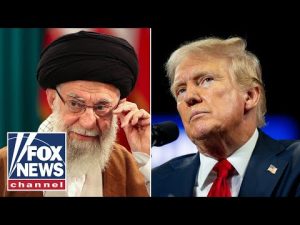In the economic whirlwind of the 1980s, Wall Street embraced the mantra that “greed is good.” Capitalism seemed like a golden ticket to prosperity, and that glimmer was irresistibly cool. Fast forward to a fateful day in October 1987, when the stock market nosedived by a whopping 22% in a single day. The financial rollercoaster was just a prelude to the economic challenges that lay ahead. That year, the U.S. trade deficit, which sat at a modest $25.5 billion in 1980, ballooned to a staggering $159.5 billion, and that was only the beginning.
Leap to the end of 2024, and the trade deficit skyrocketed to an eye-popping $1.2 trillion, with China holding the dubious honor of being the largest contributor at nearly $295.4 billion. Let’s face it, this isn’t just unsustainable; it’s like handing your rival a blank check. In the race for global dominance, China has transformed this imbalance into a sizable investment in its military and technological expansions. It’s like watching your neighbor buy a mansion with your money while you struggle to pay rent.
The former President Donald Trump saw this economic treachery as an existential threat to American interests. He argued that the nation’s affluence has been compromised by previous leaders who allowed such one-sided trade relationships to thrive. The focus was to put America first, Trump-style, which led to the controversial imposition of tariffs intended to level the playing field. Critics might deride these measures as arbitrary, but they come after years of foreign governments pulling the rug out from under domestic industries.
The devastation felt in American communities is palpable, particularly among non-college-educated workers. Factories once thrummed with the sound of production now stand silent as operations move overseas, seeking cheaper labor. The closure of the Belvidere assembly plant in Illinois painted a grim picture of economic dislocation. While the plant is expected to reopen in 2027, offering a glimmer of hope for the laid-off workers, not all stories end with such promising news. Many Americans face permanent job loss as foreign entities buy up U.S. assets—because nothing screams irony like having a steel giant like Nippon Steel try to purchase what remains of U.S. Steel.
Despite the dire economic circumstances, some elected officials still cling to outdated notions that unrestricted greed spurs innovation. They dismiss the need for tariffs or trade reforms, not grasping that these measures counteract years of practices that have disadvantaged U.S. companies. If politicians like Senator Tina Smith can’t differentiate between trade deficits and fairy tales, perhaps they should consider writing children’s books instead. The lack of economic literacy within political circles is alarming enough to make one ponder what country club these folks think they’re governing.
Ultimately, capitalism’s survival hinges on a thriving middle class. If everyday Americans are left with fewer returns for harder work, one can hardly blame them for gravitating toward political promises of easy handouts. If the system doesn’t adapt to protect its core constituents—the workers—then the U.S. might soon face a future where capitalism is an endangered species. And frankly, no red-blooded American wants that fate hanging over their heads.







